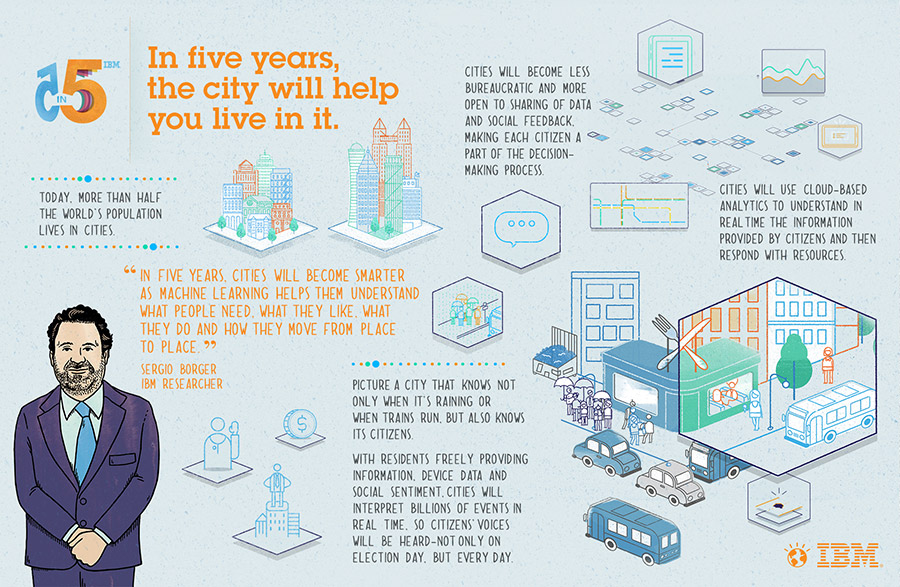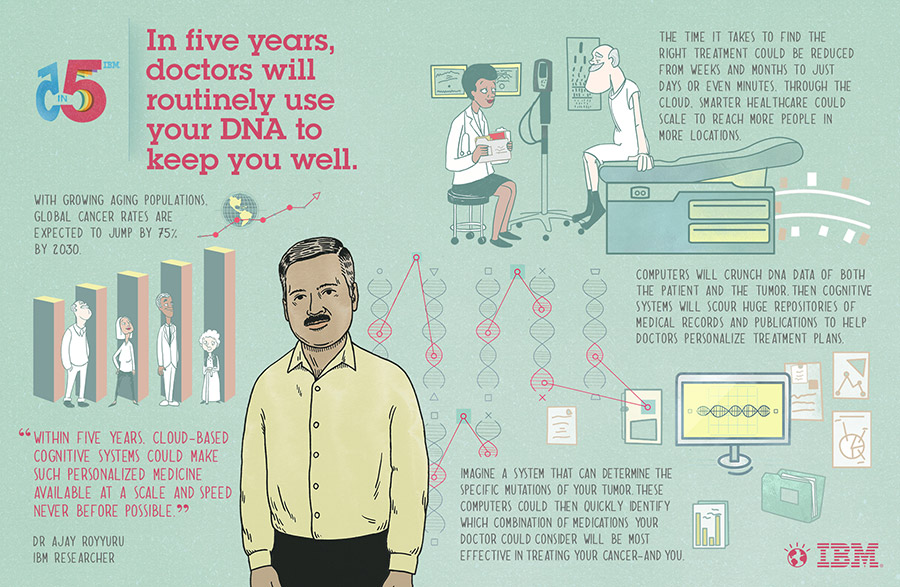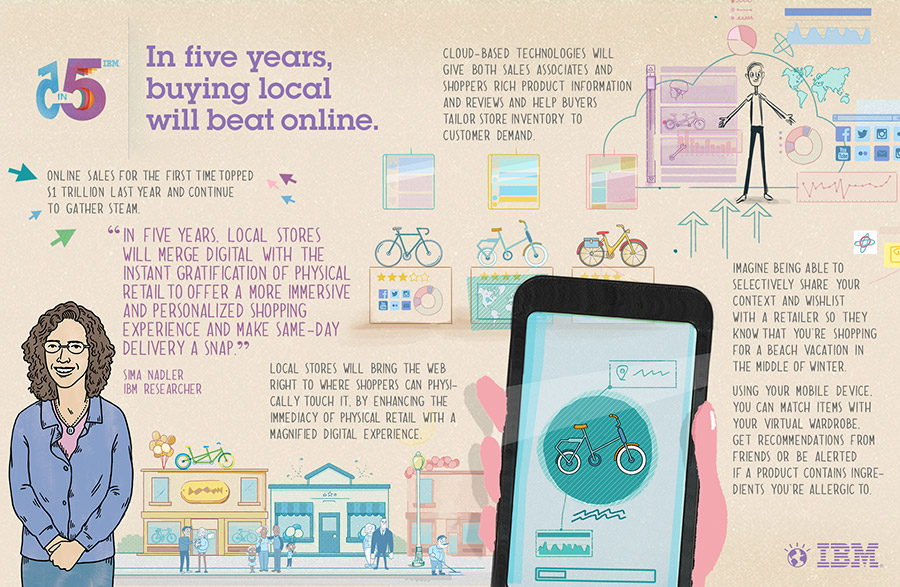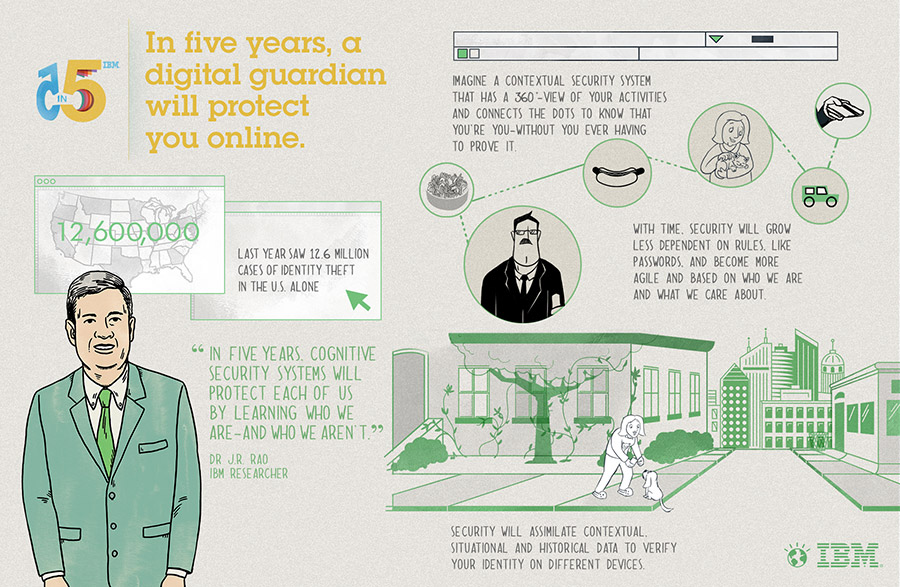Yes, it's the time of the year when everyone and their cousin reveals their bold predictions and big trends for the coming year. Tech giant IBM just released one of the better forward-looking reports: "The 5 in 5: Innovations That Will Change Our Lives in the Next Five Years," complete with videos and colorful infographics (see below).
As you would expect from IBM, all five innovation predictions are driven by emerging technologies, such as cloud computing, big data analytics, and learning technologies. At least three of their predictions have a direct relationship with the built environment, and all five are related to construction in some way.
Here are IBM's 5 in 5 innovation predictions (descriptions and graphics courtesy IBM):
1. The Classroom Will Learn You
The classroom of the future will learn about each individual student over the course of their education, helping them master the skills that match their goals.The rapid digitization of educational institutions will allow unprecedented instrumentation of the learning process. Cognitive computing, or learning technologies, will help us calculate everything we can about how each student learns and thrives, then create flexibility in the system to continually adapt and fine-tune what we deliver to that student and how this supports teachers and employers. More on this trend.
2. The City Will Help You Live In It
For citizens, smart phones enabled by cognitive systems will provide a digital key to the city. People can have fingertip access to information about everything that’s happening in the city, whether an experience is right for them, and how best to get there. Because these learning systems have interacted with citizens continuously, they know what they like—and can present them with options they might not find easily. More on this trend.
3. Doctors Will Routinely Use Your DNA To Keep You Well
Today, full DNA testing to help make treatment decisions is still rare. But cognitive systems and cloud computing may make this form of treatment mainstream. It could be done faster, more affordably and much more frequently. In addition to DNA testing for cancers, we may even see DNA-specific personalized treatment options for conditions such as stroke and heart disease. More on this trend.
4. Buying Local Will Beat Online
The technology trends will move us back to brick and mortar—but with a difference. In the future, retailers will layer increasing levels of engagement and personalization on top of the shopping experience, ultimately merging the instant gratification of physical shopping with the richness of online shopping and making same-day delivery a snap. More on this trend.
5. A Digital Guardian Will Protect You Online
Security is evolving from being based on rules, like passwords, to being automatic and made stronger through us just being us.This guardian will have your back, trained to focus on the people and items it is entrusted with based on a 360 degree of an individual’s data, devices and applications. It will make inferences about what’s normal or reasonable activity and what’s not, ready to spot deviations that could be precursors to an attack and a stolen identity. More on this trend.
Related Stories
| Nov 17, 2011
Campus-wide energy-efficiency program aims to deliver $3.5 million in energy and operational savings
Merced College and Honeywell will use the school’s energy usage statistics to develop a course curriculum on sustainability, and raise awareness among students of the positive impact conservation practices contribute to the community.
| Nov 17, 2011
Hollister Construction Services renovating bank in Union City, N.J.
Project is part of a series of ground-up construction and renovation assignments.
| Nov 16, 2011
Project completion of BRAC 132, Office of the Chief Army Reserve Building, Ft. Belvoir, Va.
This fast-tracked, design-build project consists of a three-story, 88,470 sf administrative command building housing approximately 430 employees.
| Nov 16, 2011
Architecture Billings Index moves upward
The Architecture Billings Index climbed nearly three points in October.
| Nov 16, 2011
CRSI recommends return to inch-pound markings
The intention of this resolution is for all new rollings of reinforcing steel products to be marked with inch-pound bar markings no later than January 1st, 2014.
| Nov 16, 2011
John Patelski joins Ghafari as executive vice president
As executive vice president, Patelski will be responsible for expanding the firm’s services in new strategic markets.
| Nov 15, 2011
Struggling economy demands construction industry embrace enterprise-wide risk management
In today’s business environment of high supply and limited demand, it has become especially vital for organizations in the construction sector to effectively manage risk.
| Nov 15, 2011
Suffolk Construction breaks ground on the Victor housing development in Boston
Project team to manage construction of $92 million, 377,000 square-foot residential tower.
| Nov 15, 2011
Miller joins Perkins Eastman as regional manager, Middle East and Northern Africa
Miller joins Perkins Eastman with more than 48 years of experience in architecture, design management, and construction administration for planning and infrastructure.
| Nov 14, 2011
Summit Design+Build selected at GC for new Office Concepts headquarters
The new headquarters will include 17,000 sf of office space and 15,000 sf of warehouse and feature 24 ft ceilings, an open floor plan, two conference rooms and one training room and will feature sustainable finishes throughout.





















